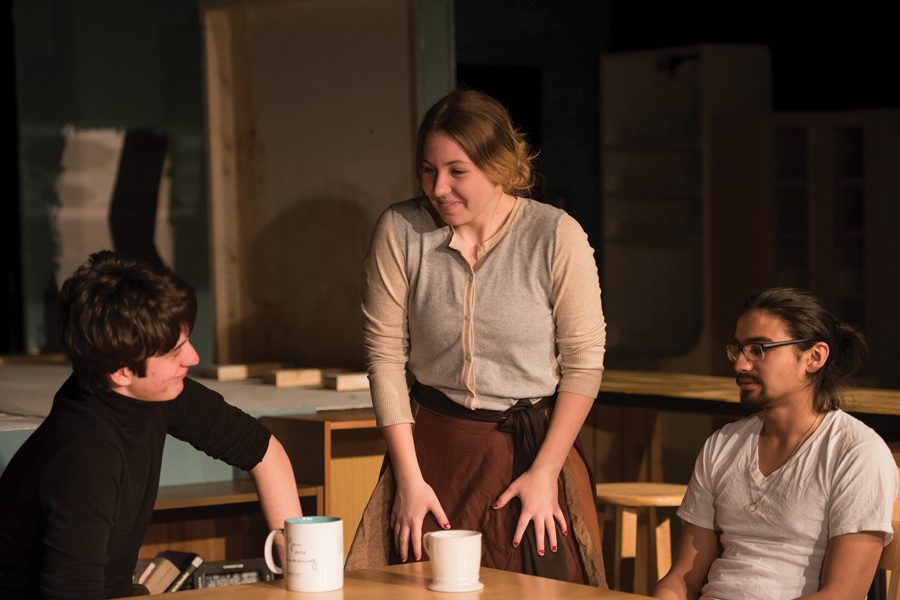Lipstick Theatre show discusses personal implications of politics
Katie Pach/Daily Senior Staffer
Performers rehearse for the upcoming production of “Body Awareness.” Lipstick Theatre’s female-centric winter show opens Thursday in Shanley Pavilion.
January 26, 2017
Rather than tackling a single politicized theme, Lipstick Theatre’s winter show considers a range of topics, including queerness, disability, neurodiversity and representation in art, said producer Lindsey Weiss.
“Sometimes the impulse in activist theater is to say, ‘We’re going to make a play about feminism today,’ or ‘Today it’s going to be a play about Black Lives Matter,’” said the Communication sophomore, who uses “they/them/their” pronouns. “This play really refrains from doing that.”
“Body Awareness,” which opens Thursday in Shanley Pavilion, centers on a lesbian couple, their son and a visiting male artist whose provocative photographs of nude women create tension in the home.
Helena Scholz-Carlson, who plays main character Phyllis, said she appreciated that the project looks at a variety of issues in a “nuanced, subtle, complicated” way.
At first, Scholz-Carlson had trouble connecting with her “hyperintellectual” and sometimes abrasive character, the Communication junior said. However, the rehearsal process helped her realize Phyllis was doing her best to grapple with complex issues, an internal struggle Scholz-Carlson thinks will be relatable for many students.
One of Lipstick’s guiding principles is to produce shows written by women. “Body Awareness,” penned by playwright Annie Baker, fits that script. Scholz-Carlson said having a female writer was especially significant due to the play’s focus on women’s bodies and the male gaze.
“Any piece of media that is created about women by men is coming at the female experience with some distance,” Weiss said. “When a woman creates something about her own experience there’s no mediator.”
Director Pauline Moll, a Communication junior, said the board of Lipstick Theatre was very open with its female-centric values and put forth specific guidelines to enforce them. The show was required to focus on a female narrative, have a cast that was at least 50 percent women and pass the Bechdel test — having two women onstage talk about something other than a man.
For Weiss, having a cast and crew made up of mostly women and nonbinary people prevented the competitive atmosphere that can arise on the more masculine technical side of theater, they said. Moll said it also helped foster a sense of camaraderie.
“It’s a story about and for women, largely,” Moll said. “The play hits home for a lot of us in a big way, and it’s been important to have people intimately connected with it.”
Weiss said they found a personal bond with the character of Jared, who is autistic. As someone on the autism spectrum, Weiss felt it was important to portray a realistic version of the character and not revert to stereotypes, they said.
In light of the divisive political climate and the recent inauguration of President Donald Trump, Moll said she felt it was “radical” to do a play with characters like Jared and his two moms whose stories are not often told. By featuring marginalized groups, the play becomes political even though its messages are not explicitly expressed, she said.
Weiss said they hope the play helps normalize the idea of people having intersecting identities and different aspects of oppression and privilege in their lives. Scholz-Carlson added that she wants the play to push audiences to consider the personal impact of wider political issues.
“People freely expressing themselves and the complexity of their feelings, especially about what’s going on in a larger world scale, is meaningful and powerful in whatever form that takes,” Scholz-Carlson said.
Email: [email protected]
Twitter: @madsburk


